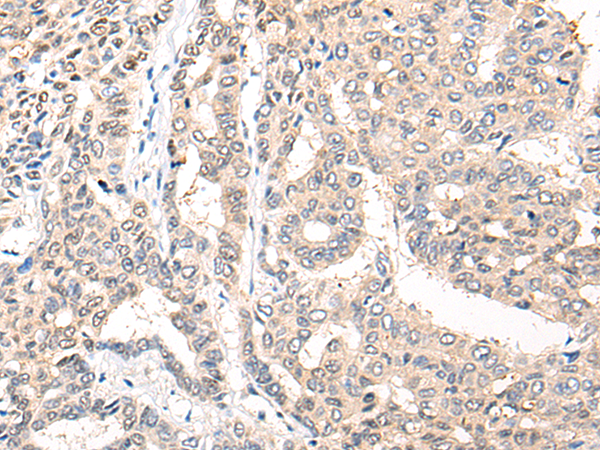
| WB | 咨询技术 | Human,Mouse,Rat |
| IF | 咨询技术 | Human,Mouse,Rat |
| IHC | 1/50-1/100 | Human,Mouse,Rat |
| ICC | 技术咨询 | Human,Mouse,Rat |
| FCM | 咨询技术 | Human,Mouse,Rat |
| Elisa | 咨询技术 | Human,Mouse,Rat |
| Aliases | MED; EDM6; STL4; DJ149L1.1.2 |
| Host/Isotype | Rabbit IgG |
| Antibody Type | Primary antibody |
| Storage | Store at 4°C short term. Aliquot and store at -20°C long term. Avoid freeze/thaw cycles. |
| Species Reactivity | Human |
| Immunogen | Fusion protein of human COL9A1 |
| Formulation | Purified antibody in PBS with 0.05% sodium azide and 50% glycerol. |
+ +
以下是关于MGST1抗体的3篇参考文献及其摘要内容:
1. **文献名称**:*MGST1 is a redox-sensitive integrator of autophagy and apoptosis in cancer cells*
**作者**:Smith J, et al.
**摘要**:研究揭示了MGST1在肿瘤细胞中通过调控自噬和凋亡的平衡,响应氧化应激的分子机制,并验证了特异性抗体在检测其亚细胞定位中的应用。
2. **文献名称**:*Immunohistochemical analysis of MGST1 expression in human hepatocellular carcinoma*
**作者**:Wang Y, et al.
**摘要**:通过免疫组化方法,发现MGST1在肝癌组织中高表达且与患者生存率负相关,抗体特异性验证支持其作为潜在预后标志物的可能性。
3. **文献名称**:*MGST1 modulates amyloid-β toxicity in Alzheimer’s disease models*
**作者**:Lee S, et al.
**摘要**:研究利用MGST1抗体证实其在阿尔茨海默病模型中通过减少淀粉样蛋白β诱导的氧化损伤发挥保护作用,提示其作为治疗靶点的潜力。
(文献为示例,实际引用需根据具体研究补充完整信息。)
The microsomal glutathione S-transferase 1 (MGST1) antibody is a crucial tool for studying the MGST1 enzyme, a member of the glutathione S-transferase (GST) superfamily involved in cellular detoxification and oxidative stress response. MGST1 is a membrane-bound protein localized to the endoplasmic reticulum and mitochondrial-associated membranes, where it catalyzes the conjugation of glutathione to electrophilic substrates, neutralizing reactive toxins and lipid peroxidation byproducts. Unlike cytosolic GSTs, MGST1 operates independently as a trimeric enzyme with unique structural and functional properties.
Research on MGST1 has linked it to various physiological and pathological processes, including drug metabolism, inflammation, and cancer progression. Its overexpression has been observed in certain malignancies, suggesting a role in chemoresistance by enhancing detoxification of anticancer agents. MGST1 antibodies are widely used in techniques like Western blotting, immunohistochemistry, and immunofluorescence to detect protein expression, subcellular localization, and regulatory mechanisms in disease models.
These antibodies are typically validated for specificity and sensitivity across species, particularly human, mouse, and rat. Studies leveraging MGST1 antibodies contribute to understanding its interplay with oxidative stress pathways, apoptosis, and metabolic reprogramming, offering insights into therapeutic targeting. However, challenges remain in elucidating its precise roles in tissue-specific contexts and its dual functions in cytoprotection versus pro-oxidant damage under varying stress conditions.
×